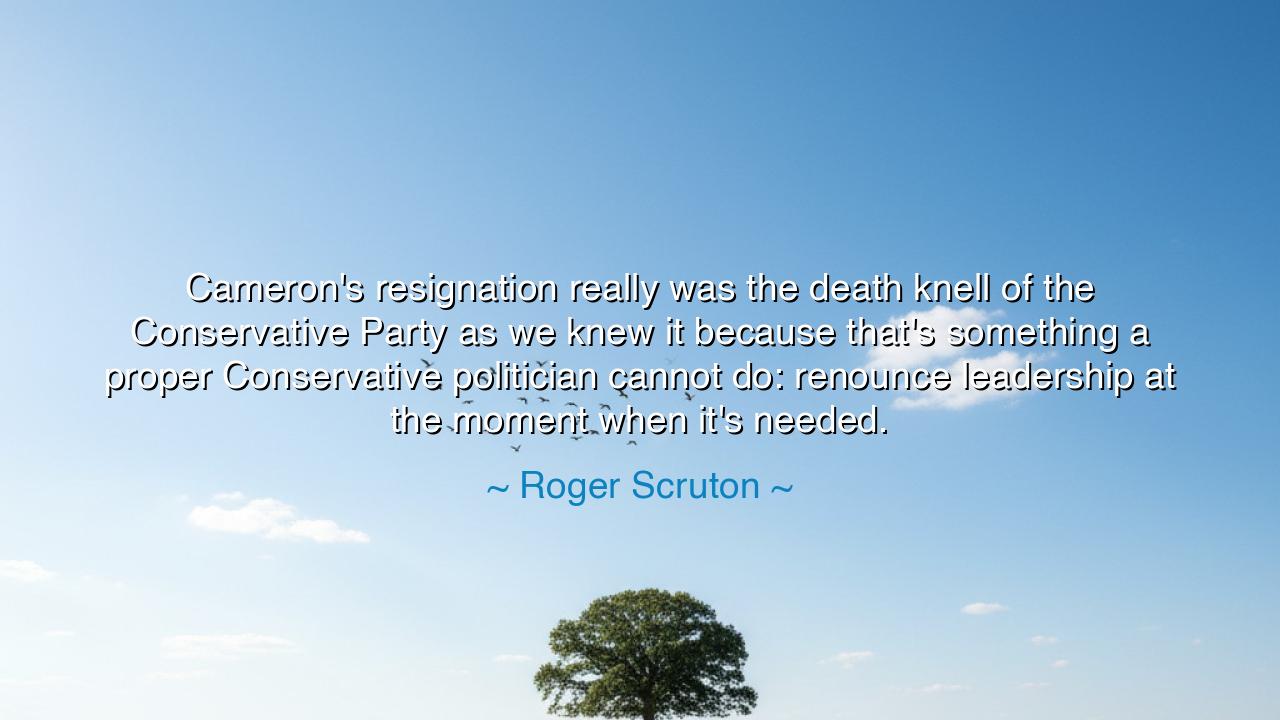
Cameron's resignation really was the death knell of the
Cameron's resignation really was the death knell of the Conservative Party as we knew it because that's something a proper Conservative politician cannot do: renounce leadership at the moment when it's needed.






Hearken to the words of Roger Scruton, the philosopher who loved the old ways and revered the traditions of his people. He declared: “Cameron’s resignation really was the death knell of the Conservative Party as we knew it because that’s something a proper Conservative politician cannot do: renounce leadership at the moment when it’s needed.” In this lament, Scruton does not merely speak of one man or one party, but of the sacred bond between ruler and people, between shepherd and flock. His words echo like the tolling of a great bell, warning that when leaders abandon their post in the hour of trial, an era itself may perish.
What is the meaning of this? In the ancient world, leadership was not a mantle one could easily shrug off; it was a sacred trust. In times of war, famine, or crisis, the true leader was expected to remain steadfast, to face storms head-on, even when hope seemed lost. When David Cameron chose to resign in the aftermath of the Brexit referendum, Scruton saw not merely a political calculation, but the breaking of that ancient trust. To his mind, the Conservative Party—an institution that prided itself on resilience, duty, and endurance—was struck with a mortal wound. For how can a house stand if its master leaves when the foundations tremble?
History gives us countless mirrors to this truth. Recall King Leonidas of Sparta at Thermopylae. Surrounded by overwhelming force, he did not cast away his crown and depart for safety. Instead, he remained at the gate with his men, knowing death awaited, but understanding that his sacrifice would forge a story that strengthened Greece for generations. Contrast this with Cameron, who, when confronted with a divided nation and the chaos of Brexit, laid down his sword and left others to fight the battle he had begun. Scruton’s grief lay in this contrast: the absence of heroic steadfastness where it was most needed.
The death knell Scruton speaks of is not only the loss of a leader, but the loss of faith. For when leaders step away in the storm, the people begin to doubt not only the man but the institution he represents. The Conservative Party, built upon the ethos of order, continuity, and service, appeared shaken, even hollowed, by the sudden abdication of its chief. The blow was not to politics alone, but to the spirit of those who trusted that their leaders would remain resolute in trial.
But let us not take his words as despair alone. Rather, they are a warning to all who hold responsibility, whether great or small. Leadership is not the privilege of comfort; it is the duty to endure when endurance seems unbearable. To abandon that duty is to betray not only others, but the very essence of one’s calling. Scruton reminds us that the world does not merely need rulers; it needs guardians, men and women who will not turn away when shadows fall.
Therefore, O listener, take this lesson deep into your heart: when you are entrusted with care over others—whether it be a family, a community, or a task—do not abandon your post when trials come. Do not renounce your place because the burden grows heavy. For it is in the hour of trial that your leadership is most needed, and in that hour your choice will echo far beyond yourself. The weak may flee, but the true leader stands.
In your daily life, practice this creed of steadfastness. Do not resign from your responsibilities when challenges rise, but hold firm. Inspire others by your constancy, as Leonidas did at Thermopylae, or as Churchill did in the darkest days of war, proclaiming that he had nothing to offer but “blood, toil, tears, and sweat,” yet offering himself nonetheless. For the world does not remember those who fled from trial; it remembers those who remained.
Thus Scruton’s words must be preserved as a flame for future generations: leadership, once taken, is not to be renounced at the moment of need. To abandon it then is to toll the death knell of trust, but to uphold it is to breathe life into nations, families, and souls. Therefore, be steadfast, O children of tomorrow, for in your constancy lies the survival of all that is worth preserving.






AAdministratorAdministrator
Welcome, honored guests. Please leave a comment, we will respond soon